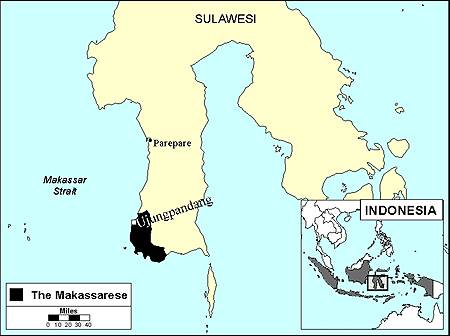|
|
Prayer Profile
The Makassarese of Indonesia
![[IMAGE]](../images4/0691.jpg) The orchid-shaped island of Sulawesi is centrally located in Indonesia. The capital city, Ujungpandang, is located in the southwestern part of the island and is well known for its seafood. The Makassarese comprise 72% of Ujungpandang's population and are the second largest ethnic group in southern Sulawesi.
The orchid-shaped island of Sulawesi is centrally located in Indonesia. The capital city, Ujungpandang, is located in the southwestern part of the island and is well known for its seafood. The Makassarese comprise 72% of Ujungpandang's population and are the second largest ethnic group in southern Sulawesi.
The homeland of the Makassarese includes the volcanic mountain area around Mount Lompobatang. Rivers and coastal plains cover the mountain regions. The province also consists of dry, windswept salt flats, rain forests, limestone cliffs, and coastal marshes.
The Makassarese are a well-built, energetic, and light-skinned people. The city dwellers have sufficient sources of food and enjoy a balanced diet; however, many villagers do not have enough food sources and suffer from malnutrition. Their language, Makassar, is divided into two dialects: Lakiu and Makassarese, and is spoken by over 70% of the people.
What are their lives like?
The primary source of income among the Makassarese is rice farming; however, they are also well known throughout Indonesia and Asia for their skill in trading.
Division of labor among the Makassarese is strict because of the rigid separation of the sexes. Men are responsible for farming, working the plows, and carrying rice bundles after the harvest. The household duties are assigned exclusively to women. The society is divided into nobility, commoners, and (formerly) slaves. A person's rank is primarily determined by his ancestral heritage.
The family structure is headed by a male. The wife and children must show respect for the head of the household while they are in public. Final decisions concerning the family are always the husband's responsibility.
In rural locations, marriages are still arranged by the parents and/or close relatives. Communication between the prospective bride and groom is strictly prohibited. Polygamy (having multiple wives) is accepted; however, it is only practiced among the wealthy since a separate home must be provided for each wife.
"Respect and honor" is the social code by which the Makassarese live. Anyone seriously offending another person's siri (respect and honor) runs the risk of being killed without any involvement of external authorities.
The Makassarese work alongside their neighbors in matters of mutual concern, such as building houses and working in the rice fields. They also get together for times of celebration, such as birthdays and weddings.
Special ceremonies are held at the beginning of planting and harvest seasons. During such ceremonies, the spirits of the deceased are honored. Hand-crafted instruments are generally incorporated into these ceremonies.
What are their beliefs?
Although ninety-seven percent of the Makassarese are Muslim, traditional ethnic beliefs and rituals are still practiced in the more remote areas. Pagan gods must be presented with regular offerings and are believed to dwell on mountain peaks as well as in soil, plants, or animals. The souls of the ancestors are also believed to exert direct influence on the everyday life of their descendants. One example is the belief that Monday is a special day for bringing live chickens to grave sites. They are to be offered to the arwah, or spirits of the deceased, in order to obtain their help in making a better living. Some Makassarese villagers consult a traditional "holy man" for invoking ancestral spirits in the harvest ritual. He is also sought after to heal through the favor of spirits and the use of medicinal herbs.
The Makassarese are rather independent in their religious views and are fascinated with spiritual realities, even to the point of possession.
What are their needs?
Although there are currently 13 mission agencies working among the Makassarese, there are less than 3,500 known believers. The Bible has been translated into their language, but the Jesus film is not yet available. The Islamic religion is very difficult to penetrate. Christian laborers who are trained and sensitive to the Muslim culture are needed to live and work among these living in spiritual darkness.
Prayer Points
- Pray against the spirits of Islam and pagan religions that have kept the Makassarese bound for many generations.
- Ask the Lord to enhance the use of Christian radio broadcasts among the Makassarese.
- Pray that the Holy Spirit will create a hunger in the hearts of the Makassarese for the Gospel of Jesus Christ.
- Ask God to encourage and protect the Makassarese Christians.
- Pray that the Lord will send missionaries to the Makassarese who will defend their rights and help raise their sense of worth.
- Ask the Holy Spirit to reveal the One True God to these who live in bondage to many pagan gods.
- Pray that God will raise up laborers who understand the Muslim culture and who can effectively take the Gospel to them.
- Ask the Lord to raise up a strong local church among the Makassarese.

Statistics
Latest estimates from the World Evangelization Research Center.
THE PEOPLE
- People name: Makassarese
- Country: Indonesia
- Their language: Makassar
- Population:
- Largest religion:
- Christians: <1%
- Church members: 3,496
- Scriptures in their own language: Bible
- Jesus Film in their own language: None
- Christian broadcasts in their own language: Available
- Mission agencies working among this people: 13
- Persons who have heard the Gospel: 597,900 (35%)
- Persons who have never heard the Gospel: 1,150,300 (65%)
THEIR COUNTRY
- Country: Indonesia
- Population:
- Major peoples in size order:
- Major religions:
- Number of denominations: 113
© Copyright 1997
Bethany World Prayer Center
This profile may be copied and distributed without obtaining permission
as long as it is not altered, bound, published
or used for profit purposes.
![[HOME BUTTON]](../graphics/home.jpg)
![[CALENDAR BUTTON]](../graphics/calico.jpg)
![[LIST BUTTON]](../graphics/listico.jpg)
[Home]
[Calendar]
[Country List]
|